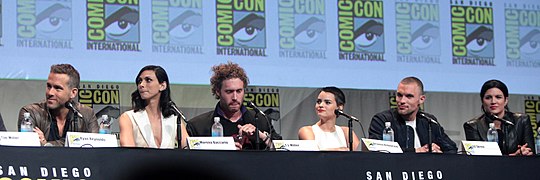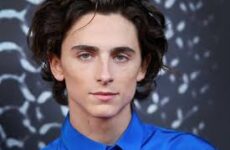By: Abiana Cruz | Treasurer
It’s no secret that Marvel has fallen off significantly in recent years. After phase three of the franchise, which included blockbusters like Avengers: Infinity War and Avengers: End Game, the studio has struggled to generate as much excitement and revenue for their projects. The Infinity Saga defined the superhero genre, but it seems the MCU has nowhere left to go.
When Avengers: End Game was released in 2019, there seemed no limit to Marvel’s reign over the box office. The film was a cultural milestone, taking over 10 years of content from the studio and giving it the most epic conclusion imaginable.

Personally, I was bawling my eyes out in the theater. And what made it so memorable was the fact that I wasn’t alone. Never in my life had I experienced such communion. People were laughing, cheering and sobbing in unison. We had all been on the long journey together and there was no reason to hide the emotions we felt. It was understood that this film, this franchise, had changed lives.
Walking away from The Infinity Saga felt like graduating high school. I was so excited to see what Marvel would come up with next. After all, I had been a closeted nerd for superhero media most of my life. I was the president of a comic book club and one of my favorite YouTube channels was “Comicstorian”. I needed this Marvel “fad” to be more than that. I needed this reformation to mean something.
With the COVID-19 pandemic, Marvel’s unstoppable force had met an immovable object. Though they tried to work through the awkward time in entertainment economics, their first phase four release Black Widow was delayed multiple times and eventually premiered in theaters and on Disney+ simultaneously. This marked a long string of mediocre pandemic releases for the studio and the beginning of The Multiverse Saga.
Now, I’m going to pause here for one minute. I know you’re wondering, “When is she going to talk about Deadpool?” Well, here we go.
In 2016, I saw the first Deadpool in theaters with my father and two little sisters. The poor man thought he was taking his three girls, the oldest being 13, to a regular superhero movie. He was wrong, of course, and we all found that out in the most awkward way possible, but I would be lying if I said I didn’t love every second of it.
I had known about Deadpool for a while at this point, having read a couple of the complete collection comics when I was younger. I thought he was a funny anti-hero and very different from the usual Justice League types I was used to. But what I enjoyed most about the character, and the comics themselves, was their ability to find a balance between the comedic and serious moments.
I think the first Deadpool movie did a great job of incorporating this balance throughout the runtime. Co-writers Paul Wernick and Rhett Reese were working on the script for over 6 years and in an interview with Yahoo Movies, Reese explained that the film’s structure played a big part in this stasis of tones.
The movie follows a non-linear timeline that would become synonymous with the franchise. Deadpool begins in a compromising fight sequence and “rewinds” to tell us how he got there. We go through heartbreak and moral quandary with our hero and finally land in the present with a solid plotline developed and the climax to the film already brewing.
Thanks to budget cuts from Fox, this structure was utilized to its fullest potential in the first film. The cost restrictions forced Reese and Wernick to be creative with their writing and work outside of the cookie-cutter superhero narratives. Their finished project, though slightly connected to Fox’s X-Men, was a standalone piece that subverted the norms of the genre and subsequently introduced Deadpool to our generation.

Two years later in 2018, Deadpool 2 released to critical praise. With Josh Brolin playing as Cable and a plot surprisingly driven by the found family trope, Deadpool 2 arguably topped its predecessor. I saw it twice in theaters and I loved it so much that I bought it as soon as it came out on OnDemand. The film had heart and as a viewer I was immediately impressed with the emotion that it drew from me. It felt vulnerable—not something I thought I’d ever associate with a superhero movie, especially not Deadpool 2.
Deadpool 2 was my favorite out of the three releases. I loved not only the recurring and newer secondary characters, but also the plot. More specifically, I enjoyed Cable and the darker tones that he brought to the film. I thought his seriousness mixed with Deadpool’s comedy provided a fresh take on the balance between moods while solidifying the balance as something to look forward to in the franchise.
Overall, I thought Deadpool 2 was great. It made me want more. More of the characters that were introduced in the film, more of the characters that I had grown to love and more exploration into the morality of Wade Wilson. I was excited to see where they would go next, and just like the rest of the fanbase, I was eager to know if (finally) we would get the collab of the century: Deadpool and Wolverine.

Now we’re caught up to the beginning of the article, when Marvel was at its peak and there seemed no end to the high-quality superhero content that the studio generated.
Unfortunately, it was all downhill from there.
After COVID-19 and the start of the Multiverse Saga, Marvel’s phase four of cinematic releases seemed to be heavily overshadowed by the series that the studio began to produce. Shows like Loki, WandaVision, and What If…? were massive draws for the studio all throughout 2021. This heavily conflicted with the consistent cinematic flops within the phase and throughout the year. Though the studio did have some major hits like Spider-Man: No Way Home and Doctor Strange in the Multiverse of Madness, both films were working hard to make up for other lackluster releases in the phase.
Now, I enjoyed some of the less popular films in phase four. I thought that Black Widow, Shang-Chi and the Legend of the Ten Rings, and Eternals all had interesting and uniquely different themes of family, love and morality that genuinely impacted me. But all three of these films seem to act as more standalone works that, so far, have little or nothing to do with whatever long form story the studio is trying to tell. And I’m sure that something will be pulled out of these films and slapped onto the scrapbook that the Marvel Cinematic Universe canon has become, but this is not the storytelling that gained the studio so many viewers toward the end of phase three.
In my opinion, another big issue that began with phase four was the forced intertextuality. As the multiverse started to oversaturate the MCU, it became nearly impossible to keep up with the plot lines we were being fed. Between the multiple timelines, variants, pointless cameos and seemingly irrelevant releases, Marvel became a melting pot of ideas that never really seemed to amount to anything tasteful.
I saw every phase four release in theaters (except for Black Widow), and it slowly became clear to me that all Kevin Feige saw in his audience was a bunch of dollar signs. Obviously, I can’t definitively say whether the audience isn’t being respected or if this was truly the plan all along, but whatever is being displayed is a joke.
The Marvel Cinematic Universe that I described at the beginning of this article was an experience. It was something that brought so many people together, transcending the boundaries of what the world believed superhero media could be. But after Iron Man snapped his fingers and turned Thanos and his army to dust, the studio became a revolving door of cash grab media that I could no longer dedicate the time to keep up with.
That was until Deadpool & Wolverine.

With the announcement that Hugh Jackman would once again be playing Wolverine in the upcoming Deadpool film, there was absolutely no way I was going to miss it. Sure, I was tired of the MCU formula, and I had no idea what was going on with Disney+, but this was going to be different. To me, Deadpool & Wolverine had to be a good movie. It had all its pieces already in place: Hugh Jackman, a well-established supporting cast and a tone that had been consistent throughout all of the Deadpool movies. Though the Marvel merger was alarming for overall content purposes, I thought it would be interesting to see what they would do with their new properties.
I went and saw Deadpool & Wolverine in theaters twice and watched it again as soon as it came out on Disney+, so it’s safe to say I’ve had ample opportunity to collect my thoughts on the film. And as much as I wanted to love it, I must admit to myself and you all that it was… just okay.
To me, Deadpool & Wolverine wasn’t the worst thing to come out of Marvel’s Multiverse Saga, but it wasn’t the best either. The film had an air of fan service that majorly stunted the narrative and left the finished product somewhere in the void of mediocrity. With a sub-par plot, barely any use of the familiar secondary characters and an insistence on fitting into the Marvel paradigm, Deadpool & Wolverine felt like a husk of the films that preceded it.
Now that may sound very harsh, and in some ways, it is, but you must understand how much I wanted to like this movie. Maybe I went in with too high of expectations, or maybe I’m just not the target audience anymore, but it doesn’t change the fact that this film was a cheap imitation of everything that the first two Deadpool films created.
Let’s start with my biggest gripe. Deadpool & Wolverine felt like crossover fanfiction. From the beginning of the film, it is clear that the writers are trying very hard to make it fit into the MCU canon. With the introduction of the Time Variance Authority (TVA) and the Deadpool dialogue about the Fox and Marvel merger, the film immediately felt different. But this isn’t where my doubt started. If I’m being honest, I enjoyed the NSYNC intro and I thought they did a great job of working in the non-linear timeline that was used to start the first two films. But my issue comes in with how important the TVA is throughout the film, and what that does to the timeline of events that we’ve seen from Fox’s pre-established Wolverine content.
The basic plot for Deadpool & Wolverine is that Logan, from the movie Logan, was the “anchor being” for Deadpool’s world, and since he is dead, Wade’s universe is slowly fading from existence. Mr. Paradox, one of the film’s antagonists, wants to put the universe “out of its misery” and transport Deadpool to a separate universe where he will have meaning as a part of the MCU. Deadpool originally agrees to this plan until he realizes that his friends can’t go to the next universe with him and will effectively die with the world. To stop this from happening, he searches for a different Wolverine to serve as the new anchor being. He ends up bringing back “the worst Wolverine” and the pair get sent to the void, where all the misfit variants and unused Marvel characters reside.
This is all well and good, but it significantly confuses the timeline, as Logan takes place in the future and the Deadpool films are canonically supposed to be a more modern adaptation of X-Men content. I wanted to be able to look past this, but it’s such a big part of the plot.

In the beginning of the movie, Deadpool uses Logan’s skeleton to kill the TVA guards, which would suggest that Logan is dead in the present which, again, does not add up with the information that we’ve been given.
In my opinion, I don’t think that the events of Logan should’ve been as important as they were in this film. I think the constant reminder of that excellent interpretation of Wolverine’s character did nothing but take away from whatever Deadpool & Wolverine was trying to do. I understand it was a great set up for a montage of Wolverine variants (which I think should’ve been the only inclusion of variants in this film) and helped force an emotional reaction for the introduction of Laura/X-23, but it wasn’t necessary in the grand scheme. All it did was make me want to watch Logan instead because of how much better of a movie it was.
Again, I understand why this may have seemed like a good idea for the writers at the time, especially with having to make sense of the multiverse in the Deadpool franchise, but I couldn’t get over how forced it all felt. Since they didn’t know how to really include Deadpool & Wolverine in the MCU, they had the two titular characters spend almost all of the movie in the void. It felt like a giant waste of time and significantly lowered the overall stakes of the film.
The previous Deadpool films focused on what the character had lost and what he gained while trying to get it back. We saw Wade struggle with his own morality as he faced the constant reminder that he’s not a good guy, but that doesn’t make him a bad guy either. There were emotional arcs that often relied heavily on the secondary characters to help him understand whatever lesson he was learning in each film. In Deadpool & Wolverine the blatant removal of the usual supporting cast in favor of a bunch of lackluster cameos did nothing but hinder my experience with the film. It was like I was watching something separate from the established world of Deadpool. And I know that technically it is, as Disney now has the rights to the character and subsequent films, but they could’ve done a better job of handling that transition.
Having Elektra, Blade, Laura and Gambit team up with Deadpool and Wolverine in the void was interesting but failed to reach the same level of intrigue that the completely random characters in the previous films somehow managed. Characters like Weasel, Dopinder, Colossus and Negasonic Teenage Warhead gave the first two films life and heart. They enhanced Deadpool as a character to a level that was clearly taken for granted in the writing of this newest installment. Without characters to act as foils or add a bit of their own charm and comedy, Deadpool is really just Ryan Reynolds in a costume giving a two-hour superhero themed set.

Another added character that acted as an antagonist throughout this film was Cassandra Nova, Charles Xavier’s twin sister who was sent to the void to stop her from being a supervillain in the real world. Immediately this didn’t matter to me, as I knew she would never appear again in the MCU, meaning the stakes were very low. This brings in my other big issue with the film.
The writing for Deadpool & Wolverine wasn’t great. From the botched timeline, constant reference to “woke” culture, minimal explanation of Wolverine’s backstory and rushed solutions to propel us into the third act, the film slowly unraveled into a sequence of mostly meaningless events.
There were two specific moments that made me realize the differences in writing style for this film. The first was when Peter came in to stop the fight between Deadpool, Wolverine and the Deadpool core (an unnecessary amount of Deadpool variants). The second was the actual climax of the film.
When Deadpool and Wolverine fought all the Deadpool variants in one continuous panning shot, I thought the scene was boring. When the Deadpool variants all regenerated after having been killed, I assumed I was being proven wrong. That was until Peter, a fan favorite from Deadpool 2,came out in costume and all the Deadpools were so excited to see him that they just stopped fighting. While it was funny, it also struck me as a cheap, rushed way to force the film into its climax.
The climax of the film was also lackluster. Deadpool and Wolverine have to cut off the power to a Time Ripper which Cassandra Nova will use to end all of the universes. Again, these stakes feel very low, seeing as we the audience knows Cassandra Nova isn’t going to end the MCU in this throwaway film. Personally, I felt nearly nothing when it was stated that whoever stopped the Time Ripper would die.
Deadpool and Wolverine argue about who’s going to make the sacrifice, and Wolverine makes a good case as to why it should be him. He starts to go toward the Time Ripper’s power supply until Deadpool hits him with a fire extinguisher and locks himself in the room with the generator that needs to be destroyed. He tells Wolverine to say hi to his friends for him and starts the process of defeating Cassandra Nova. Eventually, it’s clear that Deadpool and Wolverine have to work together to beat her, and so they do. It’s meant to be implied that they both died, but it’s quickly revealed that they both survived, and Cassandra Nova is the only one that died as an effect of the Time Ripper’s destruction.
This was when I realized how much time I had wasted watching this film.

There were multiple rushed writing moments to get us to this climax, but I think the writer’s failure to fully commit to one of these character’s deaths was what sent me over the edge. There is nothing gained by keeping Wolverine alive in this film. Whether he were to sacrifice himself or die while helping Wade save his world, I think it would’ve served as a great redemption arc. But because that doesn’t happen, I can’t help but view his character as shallow in this interpretation. Maybe that’s because the film kept evoking the memory of Logan, which was a much better sacrificial plot line, but something about the cookie cutter happy ending did not sit right with me.
My final issue with the film was the fact that it was directed by Shawn Levy. I’m not going to go into too much detail here, as I know I’ve mostly just been complaining, but how are you going to have the guy that directed Night at The Museum, Free Guy and This is Where I Leave You oversee the most anticipated team up since the first Deadpool film was announced? Don’t get me wrong, I liked two of those movies and mildly tolerated the other, but the experience that those films showcase is nothing compared to what I think was necessary for a project as big as Deadpool & Wolverine.
Now, in contrast to what it may seem, I liked this movie a little. I thought there were a lot of good aspects. I loved the fight scenes between Deadpool and Wolverine and I thought being able to see the misfit characters from previous Marvel media was fun. My favorite part of the movie was when Wolverine yelled at Deadpool before they got into their big fight in the car. It was a great showing of Hugh Jackman’s acting abilities. I also really enjoyed being able to see Wolverine as a raunchier, R-rated character. Hearing Hugh Jackman curse that much in his most iconic role just felt right. This doesn’t change the opinions I expressed in the article, but I hope it makes clear that I’m not just a hater. I’m being extra critical because I know that this could’ve been my favorite movie of the year. And since it’s not, I felt I had to explain why.

In the film there’s a continuous joke that Deadpool is “Marvel Jesus”. Though this is funny, I think there’s a strange truth to the claim. In this current era of the MCU where the studio has consistently struggled to replicate the buzz they received with their Infinity Saga, Deadpool & Wolverine was exactly what the studio needed to gain back their audience. The film is the highest grossing R-rated film of all time and has a 94% on the PopcornoMeter. Clearly my opinion is unpopular, but it’s one that I’ve been wanting to share since I left the theater on my first watch through.
Overall, I think Deadpool & Wolverine was a good Marvel movie in the sense that it did what the studio needed for viewership, but it wasn’t a good Deadpool movie. I know I’m not the only person who felt very strongly about the first two Deadpool films, but I do think that I’m a part of a slim few that didn’t let my love for the franchise blind me from what Marvel put on the screen. It was okay, but it had the potential to be great. Because of that, I’m disappointed with what we received.
Photos provided by WikiCommons.














